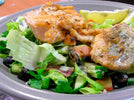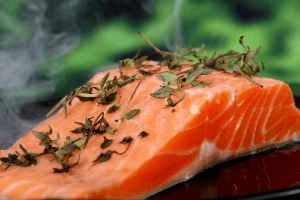
What Makes the Mediterranean Diet So Beneficial?: The Breakdown
, by Hi-Health, 7 min reading time

, by Hi-Health, 7 min reading time

You are what you eat—it’s a phrase that everyone has heard since childhood. But is it true?
In a sense, yes. Our bodies are complex machines built from the ingredients—proteins, fats, and carbohydrates—that we eat. Each meal is breakdown into its molecular components, which are then used to either fuel our activities, maintain and repair our bodies, or—if not used right away—placed into storage as fat (our bodies seem to do this step particularly well...*sigh*). So that double cheese burger kale salad really does become a part of you.
If your eating habits includes munching on a variety of veggies, lean protein, whole fruit and grains, then you’re likely getting all the essentials that your body needs in order to stay in tip-top condition. If, on the other hand, your diet is unbalanced (you eat too much of one type of food while excluding other important vitamins and nutrients) or if you’re consuming excess food (in particular inflammatory or harmful foods, such as sugars, trans fats, and alcohol) then your body might not be the lean, mean machine of your dreams.
To avoid unwanted system errors, you might want to consider upgrading your diet.
With so many fad diets and contradictory advice available, the idea of a dietary reboot can be overwhelming. Even the word “diet” is associated with deprivation and tasteless food that leaves you feeling hungry hangry.
So what can you do to improve the quality of your food without hitting the typical dietary doldrums and disconnects?
When it comes to improving your health, waistline, and chances at immortality (well, increasing the odds of living a longer, and healthier life), the Mediterranean diet certainly takes the cake— the olive oil cake that is.
While we aren’t suggesting that diets come in “one size fits all”—individual factors such as age, gender, activity level, and goals (for example, are you looking to build muscle or lose weight?) play a role in shaping your dietary requirements—the Mediterranean diet, which emphasizes eating a balanced diet composed of whole foods and healthy fats, stands out among other fad diets and “lose weight quick” schemes.
Indeed, science supports the association between the Mediterranean diet and good health. Research shows a positive association between the Mediterranean diet and improved cardiovascular health in both younger and older people. This logically follows from the fact that people who adhere to this diet tend to have lower rates of obesity, hypertension, diabetes, metabolic syndrome, and heart disease (2,3). Added bonus—the Mediterranean diet has may also reduced risk for certain cancers, Alzheimer’s, and even Parkinson’s Disease.
So what exactly is a Mediterranean diet? If your first thought goes directly to eating an extra-large meat lover’s pizza, then you have much to learn paisano.
To begin with, there’s not just “one” Mediterranean diet. Sixteen countries border the Mediterranean Sea making it a diverse culinary region. Secondly, (this should go without saying) not all Mediterranean food is healthy. Baklava—as delicious as it is—sadly is not a health food. Neither are restaurant style servings of white pasta in Alfredo sauce.
Although the specific dishes vary by country, traditional Mediterranean cookery is united by several core features. From Spain to Lebanon, it’s a culinary tradition that celebrates the consumption of minimally processed foods, lean protein, nuts, colorful vegetables, and whole fruits, as well as healthy (mono-unsaturated) fats—namely, olive oil.
Everyone knows that dieting is hard. Diets typically restrict food intake and tell people what not to eat. The idea of being told what not to eat can turn even the most well-intentioned dieter into a ravenous toddler—like a child you’ll want it even more.
The Mediterranean diet is different. In fact, it’s shouldn’t be thought of as a diet, but rather a new approach to food. Instead of focusing on restricting food, the emphasis is on using healthy ingredients to whip up a wide range of amazingly tasty dishes—limited only by your creativity. The Mediterranean diet is filling and bursting with all the zest and flavor that you’d expect from this region. Best of all—it even encourages the occasional glass of red wine.
Here’s the dish on the Mediterranean diet.

Protein is essential to maintaining a balanced diet and good muscle tone. It also is satiating, meaning that if you get enough protein, you’ll be less likely to overeat or consume excess carbohydrates and sugars throughout the day.
Not all protein sources, however, are equal. Processed meats, such as pink luncheon meats or hot dogs, which contain nitrates and are high in sodium, have been associated with an increased rick for CVD. Red meat contains saturated fat, and thus should be eaten in moderation (the suggested serving size is 4 oz, limited to a few times per month).
Under the Mediterranean diet, these meats are switched out for lean proteins—particularity fish. Fish, ounce for ounce, is lower in calories and is an excellent source of protein. Many varies are full of healthy fats too. Salmon, albacore tuna, mackerel, and sardines, which are commonly eaten in the Mediterranean, contain omega-3 fatty acids, has a positive effect on heart health and can lower inflammation.

Michael Pollan perhaps said it best when he stated, “Eat food, not too much, mostly plants.”
Research shows a positive link between vegetable consumption and longevity. There’s a reason your mom wanted you to eat your veggies—they’re good for you.
Vegetables are abundant in traditional Mediterranean diets. They’re low in calories and rich in healthy antioxidants, flavonoids, and vitamins. They’re also packed with filling fiber, which not only crushes cravings, but also keeps things running smoothly.
Don’t love the way veggies taste? Mediterranean dishes use garlic, herbs, pepper, and olive oil to turn up the flavor of any dish!

Many people shy away from eating nuts due to their high fat content. Nuts, however, are high in unsaturated fats and the potent antioxidant, vitamin E. Walnuts are a particularity good source of heart-healthy omega-3 fatty acids.
Moderate consumption of nuts has been linked to a reduced risk of cardiovascular disease, and thus are a good addition to your diet. The key is to eat only a handful or so per day as they are calorically dense. Try sprinkling them on your yogurt or salad to add a delectable crunch to your meal.

America has a large northern European heritage, and our diet, which utilizes butter stems from this fact. Many people substitute butter for margarine, which is a poor idea since it is high in trans fats, making it a proverbial wolf in sheep’s clothing. Both are used abundantly in the US for cooking and as a spread. Simply swapping these out for olive oil is one way to improve your health.
The key is not to completely eliminate fat from your diet, but rather to consume it in moderation and to use healthier alternatives. Olive oil, which is a monounsaturated fat, is a stellar example of a healthy fat.
Olive oil is a cornerstone of Mediterranean cuisine, and is a crucial component to why the Mediterranean diet imparts so many health benefits. New research notes that olive oil may lower the risk of heart disease at least in part because it helps maintain healthy blood flow and clears debris from arteries. It does this by improving the functioning of HDL (popularly known as the “good cholesterol”). Participants in this study who consumed a Mediterranean diet supplemented with 4 tablespoons of olive oil per day showed better blood tests and HDL function after a year compared to those on other low fat diets.


![PRōZE Review [2020 Update]](http://hihealth.com/cdn/shop/articles/cbd_insider_article_graphic_featured_image-11.jpg?v=1591495027)